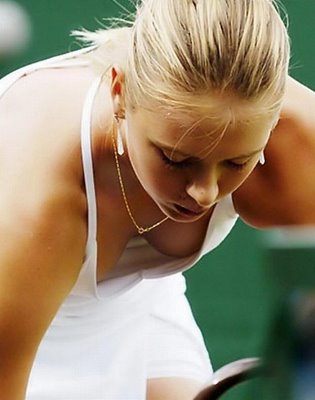
Thursday, January 26, 2012
Tuesday, January 17, 2012
Australian Open Maria Sharapova 2012
Sharapova rewriting the narrative, one dominant win at a time
We speak often of "statement wins," victories that enable players to advance in the draw and raise some eyebrows at the same time. These declarations come in a variety of ways.
It could be a young, hyped player outlasting an opponent in five sets, as Bernard Tomic, Grigor Dimitrov and Donald Young each did on Monday -- a suggestion that their fitness and maturity might be catching up with their gifts. It might be an oft-injured player winning a match and announcing that he's healthy again. The oldest player in the men's draw Tommy Haas -- once a top-five player before spending extended stints on tennis' disabled list -- won his first match and announced "I'm not done yet." Sorana Cirstea, a promising talent not long ago, dropped Sam Stosur -- the local favorite and the U.S. Open champ -- and sent the message: "Don't give up on my potential just quite yet."
But for pure statements, few spoke louder than Maria Sharapova did on Tuesday. Sharapova is a former champ in Melbourne ('08), a former No. 1 player, and the No. 4 seed. She earns more than any female athlete on the planet. Yet she's been written off by most of the tennis salon. When we talk of the Big Three in the women's game, we speak of Petra Kvitova, Serena Wiliams and Kim Clijsters. The next analyst to pick her to win this event will be the first.
The conventional wisdom is that Sharapova's is deep in the back nine of her career. That the field has caught up. That over the course of seven matches, eventually the yips will infect her serve. That her "make every shot a power shot" game, low as it is on tactics and versatility, will bite her.
Any and all of that may happen. But Sharapova sure looked like a world-beater on Tuesday. Sharapova drew Gisela Dulko, a notoriously dangerously and streaky player, who's beaten most of the top guns, including Sharapova at Wimbledon in 2009. And in roughly the time it will take for you to read this sentence, Sharapova administered a brutal thrashing, winning 6-0, 6-1. This was vintage Sharapova, dictating points, ruthlessly pushing her opponent around the court, pounding her returns, minimizing her serving issues. (She can live with five double faults and three aces spread over seven games if she's striking the ball this cleanly.) She's healthy. She's in a good head space. "I've been on the Tour for many years, played enough tournaments, I just want to be as ready as I can for the big ones," she said after the match.
Again and again, Sharapova has asserted that she doesn't mind flying under the proverbial radar, no longer top-of-mind in the tennis conversations. Be that as it may, Sharapova's results didn't speak for themselves on Tuesday. They screamed.
Read more: http://sportsillustrated.cnn.com/2012/writers/jon_wertheim/01/17/australian-open-day-2/index.html#ixzz1jk12vtkX
maria sharapova
We speak often of "statement wins," victories that enable players to advance in the draw and raise some eyebrows at the same time. These declarations come in a variety of ways.
It could be a young, hyped player outlasting an opponent in five sets, as Bernard Tomic, Grigor Dimitrov and Donald Young each did on Monday -- a suggestion that their fitness and maturity might be catching up with their gifts. It might be an oft-injured player winning a match and announcing that he's healthy again. The oldest player in the men's draw Tommy Haas -- once a top-five player before spending extended stints on tennis' disabled list -- won his first match and announced "I'm not done yet." Sorana Cirstea, a promising talent not long ago, dropped Sam Stosur -- the local favorite and the U.S. Open champ -- and sent the message: "Don't give up on my potential just quite yet."
But for pure statements, few spoke louder than Maria Sharapova did on Tuesday. Sharapova is a former champ in Melbourne ('08), a former No. 1 player, and the No. 4 seed. She earns more than any female athlete on the planet. Yet she's been written off by most of the tennis salon. When we talk of the Big Three in the women's game, we speak of Petra Kvitova, Serena Wiliams and Kim Clijsters. The next analyst to pick her to win this event will be the first.
The conventional wisdom is that Sharapova's is deep in the back nine of her career. That the field has caught up. That over the course of seven matches, eventually the yips will infect her serve. That her "make every shot a power shot" game, low as it is on tactics and versatility, will bite her.
Any and all of that may happen. But Sharapova sure looked like a world-beater on Tuesday. Sharapova drew Gisela Dulko, a notoriously dangerously and streaky player, who's beaten most of the top guns, including Sharapova at Wimbledon in 2009. And in roughly the time it will take for you to read this sentence, Sharapova administered a brutal thrashing, winning 6-0, 6-1. This was vintage Sharapova, dictating points, ruthlessly pushing her opponent around the court, pounding her returns, minimizing her serving issues. (She can live with five double faults and three aces spread over seven games if she's striking the ball this cleanly.) She's healthy. She's in a good head space. "I've been on the Tour for many years, played enough tournaments, I just want to be as ready as I can for the big ones," she said after the match.
Again and again, Sharapova has asserted that she doesn't mind flying under the proverbial radar, no longer top-of-mind in the tennis conversations. Be that as it may, Sharapova's results didn't speak for themselves on Tuesday. They screamed.
Read more: http://sportsillustrated.cnn.com/2012/writers/jon_wertheim/01/17/australian-open-day-2/index.html#ixzz1jk12vtkX


